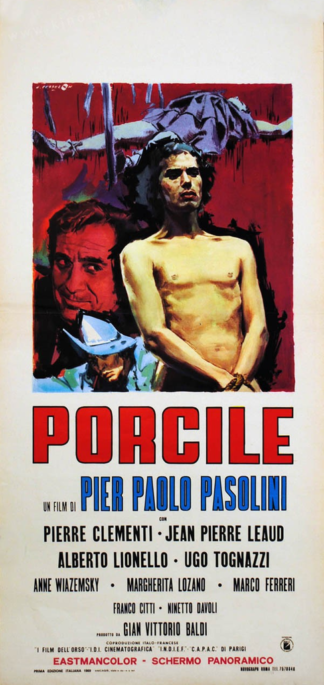 This 1969 Italian import is one of the odder films made by the late Pier Paolo Pasolini, and an interesting companion-piece to the previous year’s TEOREMA. Like that film, this one is a bizarre Marxist parable involving good looking young men wreaking havoc on bourgeoisie values.
This 1969 Italian import is one of the odder films made by the late Pier Paolo Pasolini, and an interesting companion-piece to the previous year’s TEOREMA. Like that film, this one is a bizarre Marxist parable involving good looking young men wreaking havoc on bourgeoisie values.
In PORCILE (or PIGSTY) a primitive pretty boy (Pierre Clementi) wanders through a desolate medieval landscape, where he captures and eats a butterfly and a snake before meeting up with another good looking wanderer. The young man ends up killing the other, tossing his chopped-off head into a streaming pit and cannibalizing his corpse. He later joins up with a companion who shares in the feast, and the two go on to devour several more people. Eventually the young man is captured by a band of Christian soldiers and, after admitting to his crimes (for which he’s not at all repentant), sentenced to death.
Intercut with this saga are the modern-day exploits of Julian (Jean-Pierre Leaud), another young man. Julian, who has an unhealthy affection for pigs, resides in a singularly sparse and uninviting luxury mansion in Germany that’s as desolate in its own way as the abovementioned wasteland. Julian’s ex-Nazi father is a wealthier-than-God industrialist who closely resembles Adolf Hitler, and his girlfriend Ida is a committed Marxist who makes no secret of her disdain for Julian, dismissing him as a “disgusting individualist” and eventually leaving him. Not that his bothers him terribly, as Julian heads directly to his father’s pigpen to indulge his unnatural sexual proclivities, where he’s devoured–something his father takes great care to keep secret from the world at large.
Numerous subtle connections are made between the two eras, such as modern-day references to the holocaust that directly recall the brutality of the medieval section. There’s even a character who appears in both portions, a young man played by Pasolini regular Ninetto Davoli who in the modern-day scenes is portrayed as a peasant (the ideal state of manhood in Pasolini’s Marxist-infused view). The overall point, of course, is that the violence and cannibalism of past eras are alive and well in our supposedly more civilized modern era, with the upper classes callously devouring their underlings in the same manner the Christians sacrifice the cannibal.
Of the film’s two portions the dialogue-free medieval set one is the more edifying, being gorgeously visualized and consistently fascinating. As always with Pasolini it’s the highly eccentric yet oddly symmetrical visual compositions that are most striking (as was the very queer Pasolini’s penchant, the camera has a tendency to linger incessantly on the faces and bodies of the film’s young man protagonists). There’s also a genuinely disturbed air to these scenes, as Pasolini clearly viewed the gruesome actions of his cannibal protagonist as heroic expressions of non-conformism, thus harkening forward to Pasolini’s final and most notorious film SALO (and also Pasolini’s own extremely violent demise, which is said to have been at the hands of a young man not too far removed from the cannibal seen here).
The scenes with the aristocrats in the mansion, by contrast, are stultifying, with Julian and his relatives traversing the labyrinthine halls and stairways of the residence while analyzing their privileged position in society through stilted dialogue like “My virtue is to stay inalienable” and “His ambiguous conscience has joined my pure existence.” The fact that these scenes are meant to be insufferable doesn’t make viewing them any easier.
Vital Statistics
PORCILE (PIGSTY)
I Film Dell’Orso
Director: Pier Paolo Pasolini
Producer: Gian Vittorio Baldi
Screenplay: Pier Paolo Pasolini
Cinematographer: Tonino Delli Colli, Armando Nannuzzi, Giuseppe Ruzzolini
Editing: Nino Baragli
Cast: Pierre Clementi, Jean-Pierre Leaud, Alberto Lionello, Ugo Tognazzi, Anne Wiazemsky, Margarita Lozao, Marco Ferreri, Franco Citti, Ninetto Davoli
